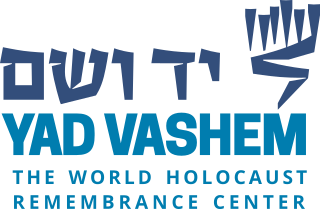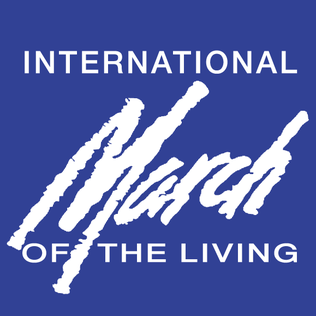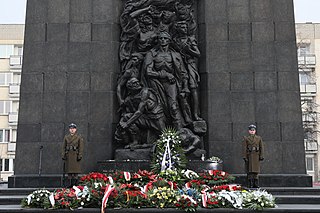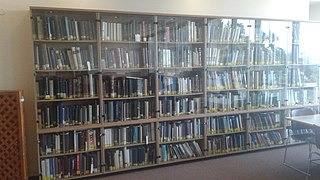Related Research Articles

Yad Vashem is Israel's official memorial to the victims of the Holocaust. It is dedicated to preserving the memory of the dead; honoring Jews who fought against their Nazi oppressors and Gentiles who selflessly aided Jews in need; and researching the phenomenon of the Holocaust in particular and genocide in general, with the aim of avoiding such events in the future.

Yom Hazikaron laShoah ve-laG'vurah, known colloquially in Israel and abroad as Yom HaShoah and in English as Holocaust Remembrance Day, or Holocaust Day, is observed as Israel's day of commemoration for the approximately six million Jews who perished in the Holocaust as a result of the actions carried out by Nazi Germany and its collaborators, and for the Jewish resistance in that period. In Israel, it is a national memorial day. The first official commemorations took place in 1951, and the observance of the day was anchored in a law passed by the Knesset in 1959. It is held on the 27th of Nisan, unless the 27th would be adjacent to the Jewish Sabbath, in which case the date is shifted by a day.

The United States Holocaust Memorial Museum (USHMM) is the United States' official memorial to the Holocaust. Adjacent to the National Mall in Washington, D.C., the USHMM provides for the documentation, study, and interpretation of Holocaust history. It is dedicated to helping leaders and citizens of the world confront hatred, prevent genocide, promote human dignity, and strengthen democracy.

Holocaust Memorial Day is a national commemoration day in the United Kingdom dedicated to the remembrance of the Jews and others who suffered in the Holocaust, under Nazi persecution. It was first held in January 2001 and has been on the same date every year since. The chosen date is the anniversary of the liberation of Auschwitz concentration camp by the Soviet Union in 1945, the date also chosen for the International Holocaust Remembrance Day and some other national Holocaust Memorial Days.

Gedenkdienst is the concept of facing and taking responsibility for the darkest chapters of one's own country's history while ideally being financially supported by one's own country's government to do so. Founded in Austria in 1992 by Dr. Andreas Maislinger the Gedenkdienst is an alternative to Austria's compulsory national military service as well as a volunteering platform for Austrians to work in Holocaust- and Jewish culture-related institutions around the world with governmental financial support. In Austria it is also referred to as Austrian Holocaust Memorial Service provided by the Austrian Service Abroad. The Austrian Gedenkdienst serves the remembrance of the crimes of Nazism, commemorates its victims and supports Jewish cultural future. The program is rooted in the acknoledgment of responsibility by the Austrian government for the crimes committed by National Socialism.

The Austrian Service Abroad is a non-profit organization founded by Dr. Andreas Maislinger in 1998 sending young Austrians to work in partner institutions worldwide serving Holocaust commemoration in form of the Gedenkdienst, supporting vulnerable social groups and sustainability initiatives in form of the Austrian Social Service and realizing projects of peace within the framework of the Austrian Peace Service. Its services aim at the permanence of life on earth. The Austrian Service Abroad carries and promotes the idea of the House of Responsibility for the birthplace of Adolf Hitler in Braunau am Inn. The Austrian Service Abroad is the issuer of the annually conferred Austrian Holocaust Memorial Award. The program is funded by the Austrian government.

The Montreal Holocaust Museum is a museum located in Montreal, Quebec, Canada, that is dedicated to educating people of all ages and backgrounds about the Holocaust, while sensitizing the public to the universal perils of antisemitism, racism, hate and indifference. Through the museum, its commemorative programs and educational initiatives, it aims to promote respect for diversity and the sanctity of human life. The Museum was founded in 1979 as the Montreal Holocaust Memorial Centre and is Canada's first and only recognized Holocaust museum.

The Holocaust Museum Houston is located in Houston's Museum District, in the U.S. state of Texas. The Holocaust memorial museum is the fourth largest in the U.S., and opened in 1996.

The March of the Living is an annual educational program which brings students from around the world to Poland, where they explore the remnants of the Holocaust. On Holocaust Memorial Day observed in the Jewish calendar, thousands of participants march silently from Auschwitz to Birkenau, the largest Nazi concentration camp complex built during World War II.

International Holocaust Remembrance Day is an international memorial day on 27 January that commemorates the victims of the Holocaust, the genocide of European Jews by Nazi Germany between 1941 and 1945. 27 January was chosen to commemorate the date that Auschwitz concentration camp was liberated by the Red Army in 1945.

Holocaust survivors are people who survived the Holocaust, defined as the persecution and attempted annihilation of the Jews by Nazi Germany and its allies before and during World War II in Europe and North Africa. There is no universally accepted definition of the term, and it has been applied variously to Jews who survived the war in German-occupied Europe or other Axis territories, as well as to those who fled to Allied and neutral countries before or during the war. In some cases, non-Jews who also experienced collective persecution under the Nazi regime are also considered Holocaust survivors. The definition has evolved over time.
The mission of the Bay Area Holocaust Oral History Project (BAHOHP) is to gather oral life histories of Holocaust survivors, liberators, rescuers, and eyewitnesses. The project is developing and maintaining a catalogue database for public use. Their goal is to provide students, scholars, resource centers on the world, and the general public access to their archives.

The Days of Remembrance of the Victims of the Holocaust (DRVH) is an annual eight-day period designated by the United States Congress for civic commemorations and special educational programs that help citizens remember and draw lessons from the Holocaust. The annual DRVH period normally begins on the Sunday before the Israeli observance of Yom HaShoah, Holocaust Memorial Day, and continues through the following Sunday, usually in April or May. A National Civic Commemoration is held in Washington, D.C., with state, city, and local ceremonies and programs held in most of the fifty states, and on U.S. military ships and stations around the world. The United States Holocaust Memorial Museum designates a theme for each year's programs, and provides materials to help support remembrance efforts.
USC Shoah Foundation – The Institute for Visual History and Education, formerly Survivors of the Shoah Visual History Foundation, is a nonprofit organization dedicated to making audio-visual interviews with survivors and witnesses of the Holocaust and other genocides, a compelling voice for education and action. It was established by Steven Spielberg in 1994, one year after completing his Academy Award-winning film Schindler's List. The original aim of the institute was to record testimonies of survivors and other witnesses of the Holocaust as a collection of videotaped interviews. In January 2006, the foundation partnered with and relocated to the University of Southern California (USC) and was renamed the USC Shoah Foundation – The Institute for Visual History and Education. In March 2019, the institute celebrated the grand opening of their new Global Headquarters on USC's campus.
The Fortunoff Video Archive for Holocaust Testimonies is a collection of recorded interviews with witnesses and survivors of The Holocaust, located at Yale University in New Haven, Connecticut. Approximately 4,400 videotaped interviews are deposited with the Yale University Library and housed in Sterling Memorial Library.

The Cape Town Holocaust & Genocide Centre began as Africa's first Holocaust centre founded in 1999. The Centre works towards creating a more caring and just society in which human rights and diversity are respected and valued. Through exhibitions, events and workshops, they endeavour to commemorate the victims and survivors of the Nazi regime and the numerous genocides that happened before and since the Holocaust.
The Cohen Center for Holocaust and Genocide Studies is one of the oldest Holocaust resource centers in the United States. Founded in 1983, the center is located at Keene State College in New Hampshire. The center was founded by Dr. Charles Hildebrandt.

Yizkor books are memorial books commemorating a Jewish community destroyed during the Holocaust. The books are published by former residents or landsmanshaft societies as remembrances of homes, people and ways of life lost during World War II. Yizkor books usually focus on a town but may include sections on neighboring smaller communities.

Anita Friedman is the executive director of Jewish Family and Children's Services of San Francisco, the Peninsula, Marin & Sonoma Counties in California, one of the largest family service institutions in America. JFCS operates more than 40 educational and social service programs, among them assisted living for seniors, adoption, refugee resettlement, assistance to the disabled, services for victims of abuse, counseling, and mental health and education services for children and youth. Each year, JFCS serves more than 100,000 individuals. JFCS, founded in 1850, is also the oldest charitable organization west of the Mississippi River.
References
- 1 2 Holocaust Center of Northern California Archived 2009-04-11 at the Wayback Machine
- ↑ "What’s old is new: Holocaust Center now part of JFCS" J Weekly, January 27, 2011
- ↑ "Holocaust Center to open in new space" San Francisco Chronicle, March 11, 2005.
- ↑ "Holocaust Center's vast library finds breathing room in new home" J Weekly, October 29, 2004.
- ↑ Yizkor Books in the Tauber Holocaust Library (formerly the Center of Northern California), accessed 2013-05-21.